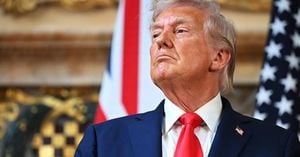Elon Musk, the billionaire entrepreneur and head of companies like Tesla and SpaceX, is on the warpath again, this time targeting the organization he helped breathe life to—OpenAI. His latest legal maneuver, filed with great fanfare late last week, seeks to halt OpenAI's transition to a for-profit enterprise, citing serious concerns over investor restrictions and what he deems unfair competition practices.
According to reports, Musk’s legal team filed for a preliminary injunction with the U.S. District Court for the Northern District of California. This request aims to put the brakes on OpenAI’s shift from its original nonprofit model to what Musk argues is now gearing up to be a profit-driven organization. His legal documents allege not only self-dealing by OpenAI's executives but also actions taken by the organization to prevent its investors from putting money toward competing startups—namely Musk's own venture, xAI.
OpenAI, founded as a nonprofit back in 2015, saw its status shift relatively recently; now it’s trying to become what they term a “capped for-profit” public benefit corporation. This transformation has sparked concern among some stakeholders, particularly Musk, who argues it strays significantly from the organization's original mission—to democratize access to artificial intelligence technology.
After departing from OpenAI's board of directors back in 2018 due to disagreements over its profit-driven direction, Musk has repeatedly expressed discomfort with the current leadership under CEO Sam Altman. He feels the company has abandoned its altruistic goals and now prioritizes financial gain. After filing various lawsuits against the organization, he now believes those working at OpenAI are acting against its foundational principles.
His attorneys allege the for-profit structure of OpenAI could endanger the company’s ability to pay future damages should Musk win his litigation. That’s some serious contention, implying there may not be resources to provide redress to investors or competitors if OpenAI should fail to operate within the bounds of the law. This latest legal filing, coming on the heels of multiple amendments and additions to the lawsuit, highlights Musk’s dissatisfaction and raises questions about the complicated relationships within Silicon Valley.
Adding to the drama, Musk included tech giant Microsoft as another defendant. His complaint argues Microsoft and OpenAI are engaging in monopolistic practices by restricting investor support for xAI, which could give them unfair advantages. If the courts side with Musk, it could force OpenAI to abandon its for-profit plans, at least temporarily, potentially reshaping the AI competitive arena.
Microsoft's involvement has been particularly contentious. They initially invested $1 billion shortly after OpenAI restructured, and their partnership has since blossomed, with substantial additional investments being pledged. Musk's narrative suggests this close relationship creates unfair advantages, asserting such collusion limits investors' abilities to diversify their portfolios effectively by investing across the competition. He labels OpenAI as effectively becoming part of Microsoft's business framework, raising concerns about transparency, financial health, and fairness.
According to Musk’s narrative, the saga doesn’t just involve corporate maneuvering. He refers to the ethical obligations OpenAI was founded upon and the belief among many stakeholders—investors and the general public alike—that the organization's shift toward profit compromises its original mission to promote safe AI development.
OpenAI has vehemently denied Musk's accusations, categorizing them as baseless and without merit. A spokesperson for the firm stated Musk's repeated legal challenges appear to stem from personal grievances rather than legitimate claims. They argue he is attempting to draw attention to his grievances rather than addressing substantive issues of competition law or corporate governance.
The courtroom drama sets the stage for more than just legal proceedings; it hints at broader conversations happening within tech circles about the ethics of artificial intelligence and the responsibilities companies have to their stakeholders—and to society at large. Should Musk prevail, it might prompt reflection on how quickly organizations pivot away from their foundational values once big money enters the picture.
What's even more intriguing is the timing of these legal proceedings. Musk’s renewed focus on OpenAI aligns closely with his career narrative of moving from co-founder to apparent antagonist. His discontent with OpenAI reflects both personal ambition and philosophical divide, drawing the lines between profit and ethical responsibility. All of this takes place against the larger backdrop of the accelerating race to dominate the AI industry—one where Elon Musk’s xAI is now battling established corporate giants.
Observers speculate this lawsuit is as much about Musk reclaiming agency over his brand as it is about OpenAI’s future. By portraying himself as the defender of the original mission, Musk seeks to galvanize support from the very tech community and consumers who might feel uneasy about AI's rapid commercialization.
So, what does the future hold for OpenAI, Musk, and the AI industry? Only time will tell. But one thing is clear: this battle isn't just about the bottom line. It's about the fundamental ethics of how artificial intelligence evolves and who gets to dictate its future direction.



